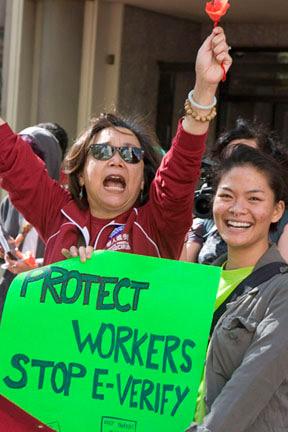Across California on April 10, activists demonstrated for immigration reform and articulated a sharply different version from any currently obtaining in the US Congress of what that reform entails.
In San Diego, California, nine activists completed a six-day hunger strike outside the Mission Valley Hilton Hotel on April 10 – the day demonstrations took place across the United States demanding immigration reform. Hunger strikers were protesting the firing of 14 of the hotel’s workers, after Evolution Hospitality, the company operating the Hilton franchise, told them that it had used the government’s E-Verify database to determine that they didn’t have legal immigration status.
“The company says that E-Verify is making them do this, even though many of the workers have been working here for years,” said Sara Garcia, a supporter and hunger striker from House of Organized Neighbors, a local community organization. “But they started firing them when the workers were organizing a union.”
“I clean 16 to 18 rooms a day, and they pay me $8.65 an hour. No one can live on that,” explained Leticia Nava, a fired worker. “I’m a widow with three children who depend on me. What is happening is not just. We are immigrant workers, and the only thing we’re asking is to work. That’s not hurting anyone.”
Garcia and Nava accuse the company of using E-Verify in order to retaliate against 14 women for their union support. But they also say that the E-Verify system is used much more extensively, to fire workers even where no union organizing is taking place.
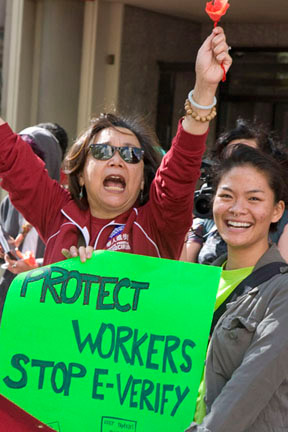 San Francisco demonstrators call for an end to immigration-based firings.
San Francisco demonstrators call for an end to immigration-based firings.
“Many companies are doing the same thing. They’re manipulating the system because what they’re really interested in is low wages,” Nava charged. “This isn’t the first time this happened to me. I was fired the same way two years ago. Now my children are all scared because they see it’s harder for me every day. Tomorrow, I’ll have to go out and find another job, and E-Verify makes that more and more difficult. The impact on us is not just money – it affects all aspects of my life.”
Nava and Garcia joined the tens of thousands of immigrants and immigrant-rights activists who demonstrated on April 10 calling for the reform of US immigration laws. Yet on the same day, legislators drafting reform proposals in the US Senate proposed changes that would make Nava’s experience more widespread than ever; the changes showed up in a bill they introduced a week later.
Both Garcia and Nava agreed that getting rid of E-Verify should be part of immigration reform. “This part of the law is inhumane and unjust,” Garcia says. “It has economic, psychological and even moral effects. Instead of children worrying about schoolwork, they’re worried about how they’ll survive, or even just eat.” Nava declared simply, “This part of the law should be eliminated.”
Congress, however, proposes to exact a price for the legalization of undocumented immigrants. The “Gang of Eight” senators drafting the reform bill announced they intend to expand the E-Verify system to cover all employers and make its use mandatory. This was only one of a number of measures that would increase the severity of many of the anti-immigrant measures already part of US law.
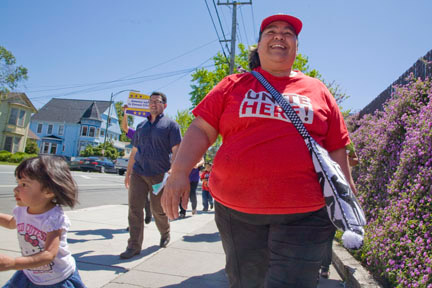 Lorena Reyes, who was fired from her job as a housekeeper at the San Jose Hyatt Hotel because she supports the union and protested sexual harassment, marched for immigrant rights.
Lorena Reyes, who was fired from her job as a housekeeper at the San Jose Hyatt Hotel because she supports the union and protested sexual harassment, marched for immigrant rights.
The Hilton workers and their supporters, as well as the union helping them, UNITE HERE, all believe that immigration reform should include a legalization process. They want one that would give the 11-12 million undocumented people living in the United States a quick and accessible way to gain legal status. That demand ran through all of the hundreds of demonstrations around the country, from the 30,000 people on the mall in front of the Capitol Building in Washington, DC, to the thousand marchers in downtown San Francisco. It was a demand voiced by hundreds of janitors and security guards in Silicon Valley, and by teachers and elementary school students in Berkeley, California.
The senators, however, are proposing a plan that would require undocumented people to spend a decade in a provisional status before even being able to apply for permanent legal residence. Then they would have to maintain that status for another three years before they could apply to become citizens and gain basic political rights. Moreover, only people who’ve come to the United States before Jan 1, 2012, can apply for provisional status, and, significantly, the legislation says that no one can apply for provisional status until a plan for “securing” the border has been drafted by the Department of Homeland Security (DHS) which could take another six months.
The citizenship process is so overloaded that processing applications now takes months, even years. And instead of anticipating the logistical bottleneck of millions of people applying for citizenship at the same time, the senators declared that legalization applicants would get no dedicated process.
People seeking legal status would have to “get in the back of the line” – their visa applications would be processed only after all other pending applications. That could have people waiting still more years. Today, the government is still processing visa applications for some relatives of US citizens and residents that were filed over two decades ago. The undocumented would only become eligible for residence if they learned English and if they or a family member were continuously employed for ten years.
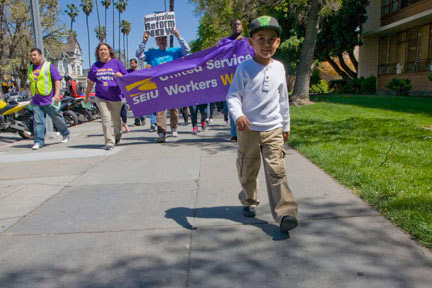 Silicon Valley janitors and security guards marching for immigrant rights.
Silicon Valley janitors and security guards marching for immigrant rights.
The senators further announced they would charge each applicant a penalty of $500 to file an application, another $500 six years later, and a further $1,000 before an applicant could apply for residence, on top of fees to cover the costs of the program. Leticia Nava, for instance, would have to raise $2,000 right away for herself and her children and would acquire an additional obligation of $6,000 plus fees. At $8.65 an hour, paying it off would be hard. The idea of long waiting periods and obstacles was criticized by AFL-CIO President Richard Trumka, who warned, “Families, including siblings and children, must not pay the price of our broken policies.”
An even greater shift in US immigration policy is in the works, however. The senators chipped away at the family preference system itself. They announced that there would no longer be a category allowing visa applications for the brothers and sisters of US citizens. At the same time, their bill would create a new program eventually giving 120,000 visas a year to people with the work skills demanded by US employers, rated on a point system. The undocumented could apply for these “merit-based” visas, but would compete against others.
This moves US immigration policy backward in time. Through the cold war, it was structured to allow employers to bring workers, called braceros (manual laborers who worked with their brazos, arms) to labor on the railroads and in the fields. At the same time, ferocious immigration enforcement led to the deportation of as many as 1 million immigrants a year – called “wetbacks” – who tried to work outside of that guest worker program. The civil rights movement abolished the bracero program, and with the 1965 Immigration and Naturalization Act, a family-based system replaced it.
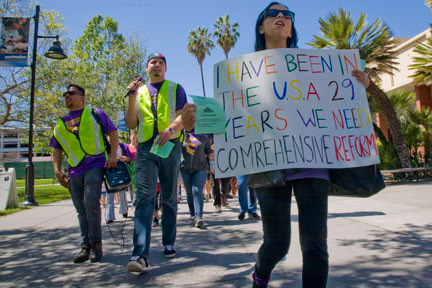 A Silicon Valley student in the April 10 demonstration.
A Silicon Valley student in the April 10 demonstration.
“Even before the braceros, we had contract labor, like the system that brought my ancestors, Chinese farmers, to build the railroads and set up irrigated agriculture here,” explained Reverend Deborah Lee of the Interfaith Coalition for Immigrant Rights in Oakland, California. “Whether we were Chinese migrants or braceros, we were just labor. Companies could spit you out and send you back home. They still can – we still have programs like that. We need to recognize the humanity of people. We’re not just workers – we’re human beings. We need a system in which we can create families, have our spouses come, raise our children and be part of society. So the senators are really changing the definition.”
Even more direct labor supply schemes will be part of the senators’ bill. Currently, the three main official guest worker visa programs, H1B, H2A and H2B, allow employers to recruit about 250,000 workers outside the country every year and bring them with visas that require them to work in order to stay. Some allow workers to change jobs (H-1B), while others require them to remain with the employer who contracted them (H-2A and H-2B). Some, but not all, visa programs require employers to recruit locally first (H-2A), and allow workers to eventually apply for residence (H-1B).
In parallel with the senators’ deliberations, the AFL-CIO and the US Chamber of Commerce announced agreement on yet another such program, called the W visa. It would allow employers to recruit workers to fill labor shortages documented by a new federal commissioner, require them to recruit locally first and peg wages of guest workers to an employer’s existing wage scale or to prevailing wages in the industry in which they’re recruited. Workers would be able to change jobs but could not remain out of work for longer than 60 days or they’d have to leave the country.
Ana Avendaño, assistant to AFL-CIO President Trumka and director of immigration and community action for the AFL-CIO, wrote that under this proposal “employers have the comfort of knowing that, as the economy picks up, workers – foreign or domestic – will be available to fill jobs that will fuel economic growth. Workers have the comfort of knowing that local workers will have the chance to apply for those jobs.”
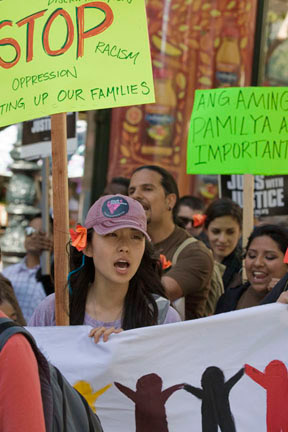 In San Francisco, the march included activists from the Chinese and Filipino communities.Making a deal on a new guest worker program is a means to win over Republican senators and representatives who respond to employer lobbying. In its mobilization efforts around the country, the AFL-CIO and other Washington DC-based lobbying groups have announced their central priority is a “pathway to citizenship” – that is, a legalization program for undocumented people.
In San Francisco, the march included activists from the Chinese and Filipino communities.Making a deal on a new guest worker program is a means to win over Republican senators and representatives who respond to employer lobbying. In its mobilization efforts around the country, the AFL-CIO and other Washington DC-based lobbying groups have announced their central priority is a “pathway to citizenship” – that is, a legalization program for undocumented people.
This goal is painted in broad strokes. “There is absolutely no distinction,” said Trumka at an event kicking off an April 10 rally, “between workers who were born in this country and those who came here to build a better life. We’re all in the same boat, every one of us who works for a living. We rise or fall together.”
Other organizations, however, have been critical of those aspects of the senators’ plan that will increase enforcement and expand labor supply programs. Communications Workers of America President Larry Cohen warned that, “CWA will monitor any proposed changes to visa programs like the H-1B visa, which are sought after by business but have cost US technicians and other workers tens of thousands of jobs.” The Senate bill would raise the numerical limit on those visas. Columbia professor and former labor organizer Mae Ngai noted in The New York Times, “From the agricultural ‘Bracero Program’ of the 1940s and ’50s to the current H-2 visa for temporary unskilled labor, these programs are notorious for employer abuse.”
In Washington State, Rosalinda Guillen, director of Community to Community Development, a farm worker group that organizes cooperatives and advocates for immigrant rights, worried that once undocumented agricultural laborers gained legal status, they would face competition from guest workers brought into the country by growers. She noted that the state’s agricultural lobby is pushing intensely for guest workers. The Senate bill transforms the existing H2-A agricultural guest worker program into two new ones – W2 and W3 – and sets up a special legalization process for farm workers in exchange for making the programs more attractive to growers.
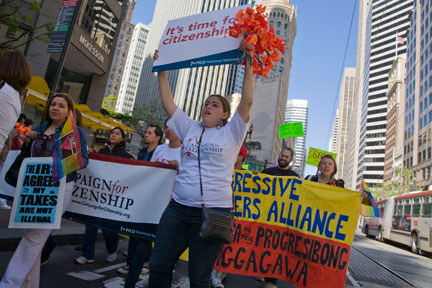 The San Francisco marchers included a contingent from the Progressive Workers Alliance, a group of organizing projects among low-wage workers.
The San Francisco marchers included a contingent from the Progressive Workers Alliance, a group of organizing projects among low-wage workers.
“Farm workers deserve an opportunity to begin building healthy, sustainable careers in the food system,” Guillen explained. “As long as corporate agriculture is allowed to legally bring in an exploitable workforce, our food system will continue to decline and farm worker families will continue to be the lowest-paid workers in the country, working one of the most dangerous jobs, so consumers can eat cheap food and corporations can continue to get richer!”
Many of the April 10 rallies highlighted other problems with US immigration law. In Berkeley, California, a group organized by teachers and the Alameda Labor Council lined a pedestrian bridge across the freeway. They were led by children from Jefferson Elementary School, who spoke to the crowd. One, Kyle Kuwahara, read a letter he’d written to President Barack Obama, protesting the decision by US immigration authorities to refuse to allow fourth-grade student Rodrigo Mendoza, along with his family, to return home to Berkeley after a vacation in Mexico.
“He has been in our school for five years and he is a friend of mine,” Kuwahara wrote. “Rodrigo is not free to come back. In school we are learning about all these important people like Martin Luther King and Rosa Parks who fought for people’s civil rights and freedom. So what about Rodrigo’s freedom? Who is fighting for his freedom?”
The Mendoza family’s crisis highlighted the massive enforcement wave of the last four years, in which over 2 million people have been detained and deported. Almost all the April 10 rallies demanded a moratorium on mass deportations while Congress debates reform proposals. Some even demanded that the huge system of privately run immigrant detention centers be dismantled.
 Jefferson Elementary School students called on President Obama to allow the Mendoza family to come back to Berkeley.
Jefferson Elementary School students called on President Obama to allow the Mendoza family to come back to Berkeley.
Many in the Berkeley crowd had been engaged in a long fight to save the jobs of workers at a local foundry, Pacific Steel Casting. In December 2011 and January 2012, 214 undocumented workers were fired after the Immigration and Customs Enforcement (ICE) agency examined company records in a process called an I-9 audit. After identifying workers who had no legal immigration status, or “work authorization,” ICE then sent the company a letter demanding it fire them. The same process has led to the firings of hundreds of thousand of workers across the country during the Obama administration.
City councils throughout the East Bay sent letters to DHS Secretary Janet Napolitano pointing out that the firings would not only be a disaster for the families involved, but would also damage local communities. Political pressure succeeded in delaying the firings but couldn’t stop them. Richmond, California, Mayor Gayle McLaughlin accused ICE of undermining her city’s already devastated economy in the middle of a recession. “Their firing is a violation of [the workers’] human rights,” she said at the time. “When they say that [immigration] raids are targeting criminals, it’s not true. People who are just trying to make a living are being targeted, big time.”
The company and the workers’ union, Molders Union Local 164, released a joint statement in which Pacific Steel declared, “These terminations were not only devastating to the workers and their families, but also to the workforce at PSC … [We] implore the protestors to direct their attention to the Department of Homeland Security and federal policy makers.” The union also criticized “the broken and unfair laws used by the government to disrupt and destroy the lives of many of our friends and colleagues.”
A month before the April 10 demonstrations, one union even went on strike over the firing of three workers in an E-Verify check. The three workers lost their jobs when Waste Management, Inc. fired them for lacking work authorization. The company sent them the notice in the middle of a bitter conflict over the union contract with Local 6 of the International Longshore and Warehouse Union (ILWU).
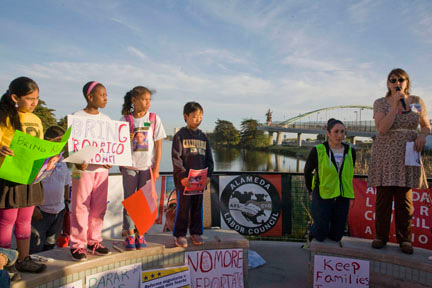 Berkeley teachers and the Alameda Labor Council organized the students to come to the immigrant rights demonstration.
Berkeley teachers and the Alameda Labor Council organized the students to come to the immigrant rights demonstration.
“I believe the company is trying to intimidate workers,” said ILWU organizer Agustin Ramirez. “For a long time, workers didn’t fight with this company. But recently they decided to terminate the contract, which expired years ago. The company was threatening their jobs, and by terminating the contract, they could go on strike.
So WMI [Waste Management Inc.] used this way to try to stop them,” Ramirez continued. “It was like WMI was telling the workers, ‘Since you dare to question what we do, then we’ll question your documents.'”
The ILWU filed an unfair labor practice charge, accusing the company of “unilaterally implementing the E-Verify employment eligibility verification program” and “terminating employees for alleged lack of authorization to work in the United States,” among other charges. Then the workers struck for a day over the company’s legal violations.
“While the company is using immigration law for retaliation,” Ramirez said, “the real problem is the law itself, because it makes firing the punishment for lacking legal status. The reality is that all the workers have families here and are trying to stabilize their situation. One even came to the US when she was only three, and has an application for the DREAM Act program [which defers deportation for students for two years and gives them work authorization]. The company fired her anyway.”
Fights against the use of E-Verify have grown over the last two years – at Hilton and Waste Management, at the Mi Pueblo supermarkets and at many other worksites. Immigrant workers have organized marches and demonstrations against the I-9 audits, which have hit not only union molders at Pacific Steel, but union janitors in Los Angeles, Sacramento, Minneapolis, Seattle and other cities, and nonunion workers at Chipotle restaurants and the American Apparel clothing factory.
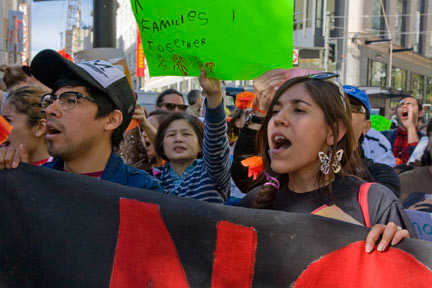 San Francisco marchers.
San Francisco marchers.
In the 1990s, a similar wave of firings directed against unions and organizing drives gave political weight to immigrant activists inside the AFL-CIO, as they fought for a pro-immigrant policy. They argued that “employer sanctions,” which refers to the law that provides the legal basis for E-Verify and I-9 audits, was an inherent violation of workers’ rights to organize and to work and support their families. At the AFL-CIO convention in 1999, they were able to convince the federation to call for repealing the law.
In 2009, however, the AFL-CIO executive council adopted a document known as The Labor Movement’s Principles for Comprehensive Immigration Reform. Point two calls for, “A secure and effective worker authorization mechanism.” Yet the massive wave of immigration-related firings is characteristic of how work authorization is actually enforced. Local fights against firings inevitably question support for sanctions in Washington, DC. They suggest that instead of treating increased enforcement as something to be traded for legalization, ending it should be part of labor’s immigration reform program.
Reverend Lee of the Interfaith Coalition predicts that unions and immigrant rights organizations may eventually be divided over whether to support Congressional reform proposals, since they call for vastly increased enforcement. “A lot of families are suffering now because of earlier immigration deals trading legalization for enforcement. We need to think long-term if the deals today are going to create more problems for families in the future.”
In some communities, anger against previous tradeoff deals is palpable. The Coalición de Derechos Humanos (Human Rights Coalition) in Tucson called comprehensive immigration reform “primarily a vague promise used to attract immigrant and Latino voters, [while] border communities have suffered the costs of irresponsible and brutal enforcement policies, resulting in death and violence.” Increased border enforcement was part of the tradeoff for immigration amnesty in 1986, and was beefed up again in the Clinton administration immigration reform package of 1996.
 A member of United Service Workers West in the Silicon Valley march.
A member of United Service Workers West in the Silicon Valley march.
A recent study by the Migration Policy Institute found the federal government spends more on border and immigration enforcement than on all other law enforcement agencies combined. The bill drafted by the Senate Gang of Eight would spend at least another $3.5 billion immediately on border enforcement,with the possibility of spending another $2 billion later. Enforcement would include building more walls and using drones and other means of electronic surveillance. Moving forward with some aspects of legalization would only come after the government made plans for surveillance and curtailment of undocumented migration and showed efforts to implement them. The special court in Tucson that tried 70 young migrants, brought before judges in chains and sentenced to time in a federal lockup for border crossing, would be expanded to process 210 people per day.
Derechos Humanos also called for the repeal of employer sanctions and the E-Verify system. It advocates ending guestworker programs because they increase job competition and pit resident workers against those brought to the United States by employers. Instead, “job creation and training programs should be implemented for all unemployed workers, ensuring a healthy and robust workforce,” according to a recent statement responding to the Gang of Eight proposal.
Rising demands for a more rights-based reform than the one on the table in Washington will certainly make negotiations more difficult. In the past, those calling for one have been accused of undermining efforts to achieve what’s “politically possible,” at least according to the Beltway calculations. But these voices won’t be easily shut out of the national debate.
Jon Pedigo, a priest at Our Lady of Guadalupe Church in San Jose, organized a breakfast for people of faith as part of the April 10 actions in the heart of Silicon Valley. In his homily the Sunday before, he told parishioners, “The authorities will try to silence these voices by dismissing them as irrelevant. We have learned through these 50 years of organizing campesinos, low wage workers, and immigrant families that you cannot shut down the conversation. You cannot silence the truth of our woundedness. We must confront authorities with stories of children’s fearing that their parents might be taken away from them and deported. The voices of mothers whose children have been torn from their arms cannot be ignored.”
Join us in defending the truth before it’s too late
The future of independent journalism is uncertain, and the consequences of losing it are too grave to ignore. To ensure Truthout remains safe, strong, and free, we need to raise $46,000 in the next 7 days. Every dollar raised goes directly toward the costs of producing news you can trust.
Please give what you can — because by supporting us with a tax-deductible donation, you’re not just preserving a source of news, you’re helping to safeguard what’s left of our democracy.
